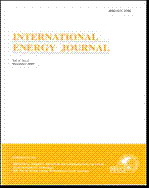ThaiScience
ThaiScience
INTERNATIONAL ENERGY JOURNAL
Volume 22, No. 04, Month DECEMBER, Year 2022, Pages 425 - 434
Laboratory testing and investigation of teg cookstoves and study of its performance
Imlisongla Aier, Ujjiban Kakati, Virendra Kumar Vijay, Priyanka Kaushal
Abstract Download PDF
Laboratory testing of TEG cookstove is conducted with eucalyptus fuelwood following the testing protocols WBT 4.2.3 and ISO 19867-1 to evaluate the performance of the stove and CO and CO2 emissions were measured to obtain the values of modified combustion efficiency. The performance results were analysed in terms of thermal efficiency, firepower, turndown ratio and specific energy consumption. It was found that the thermal efficiency conducted by WBT 2.2.3 resulted in the range 15-24% while ISO protocol testing was 18.23%. The experimental results found the least fuel burning rate, efficiency, and firepower during the cold start phase of the experiment. The duration of the simmering phase was nearly 2-3 times more than the duration of the hot-start phase while the turndown ratio was in the range of 0.8 to 1.5 which concluded that higher specific fuel consumption and lower thermal efficiency was a consequence of higher power output, or an inability to turn down the stove power. Higher value of MCE was calculated during simmering phase compared to high power tests due to availability of sufficient air to combust the gases in the combustion chamber
Keywords
Cookstove, Efficiency, ISO protocol, Modified combustion efficiency, Water boiling testINTERNATIONAL ENERGY JOURNAL
Published by : Asian Institute of Technology
Contributions welcome at : http://www.rericjournal.ait.ac.th
